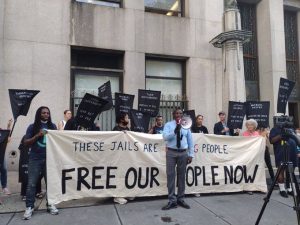
Protestors displayed signs showing inmates who have died in prison since the 1994 Crime Bill was passed.
State Lawmakers, advocates, and formerly incarcerated New Yorkers all gathered in protest on the 28th anniversary of the 1994 Crime Bill signed into law by former President Bill Clinton. Among those present were Assemblywoman Amanda Septimo, D-Bronx; David Weprin, D-Queens; and freshmen Assemblyman Eddie Gibbs, D-Harlem.
“The legacy of the 1994 Crime Bill was not betterment, it was punishment,” said Assemblyman Gibbs. The 1994 Crime Bill led to heightened incarceration rates of individuals from Black and Brown communities peaking in 1999. Critics say this legislation made it increasingly difficult for incarcerated individuals to work towards betterment by cutting access to financial aid for incarcerated college students and created financial incentives for states to decrease their earned time programs – programs which allow participants to reduce their sentence to varying degrees.
“Communities not cages, they lock us up for ages,” said protestors chanting against the bill. The Communities Not Cages coalition – a grassroots organization working to end mass incarceration – organized the event in support of three separate bills – Eliminate Mandatory Minimums Act (S.7871), Second Look Act (S.7872), and Earned Time Act (S.7873) – which are all seeking to address the sentencing that originated during the 1970’s War On Drugs and was further progressed by the 1994 Crime Bill.
“These bills are actually community safety bills by providing these services and giving people something to push for,” said David Delancey, of the advocacy group Exodus Transitional Community – an organization that assists formerly incarcerated people. “I was a minor so I thought like a minor, I never had male examples in front of me in my community at the time,” said Delancey, “I served 20 years before I even lived,” said Delancey who was in the corrections system from the age of 17 onward.
The Eliminate Mandatory Minimums Act seeks to eliminate mandatory minimums, forcing judges to consider the specific factors on a case-by-case basis. The Second Look Act would grant judges the ability to review and reconsider past sentences. The Earned Time Act hopes to encourage positive transformation and rebuild family bonds for incarcerated individuals by aiming to strengthen “good time” and “merit time” laws.
“The 1994 Crime Bill was driven by racism, a belief in the disposability of Black and Brown people, the epitome of the incarnation system,” said Marvin Mayfield of the Center for Community Alternatives – an organization that promotes reintegrative justice and reduced reliance on incarceration. “Ashes to ashes, dust to dust,” said Mayfield who delivered the closing remarks and poured dirt over a copy of the 1994 Crime Bill to signify a symbolic burial of the legislation.









